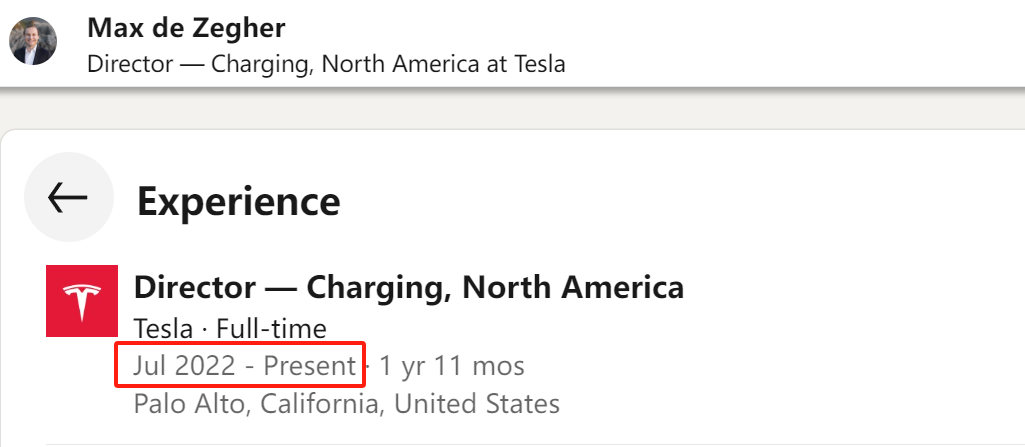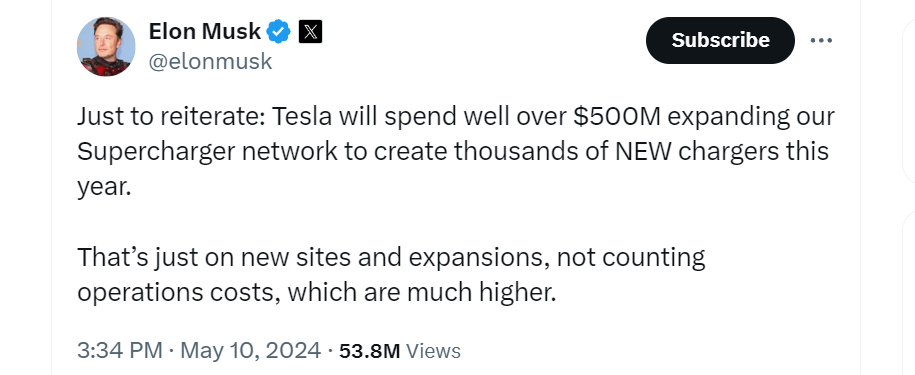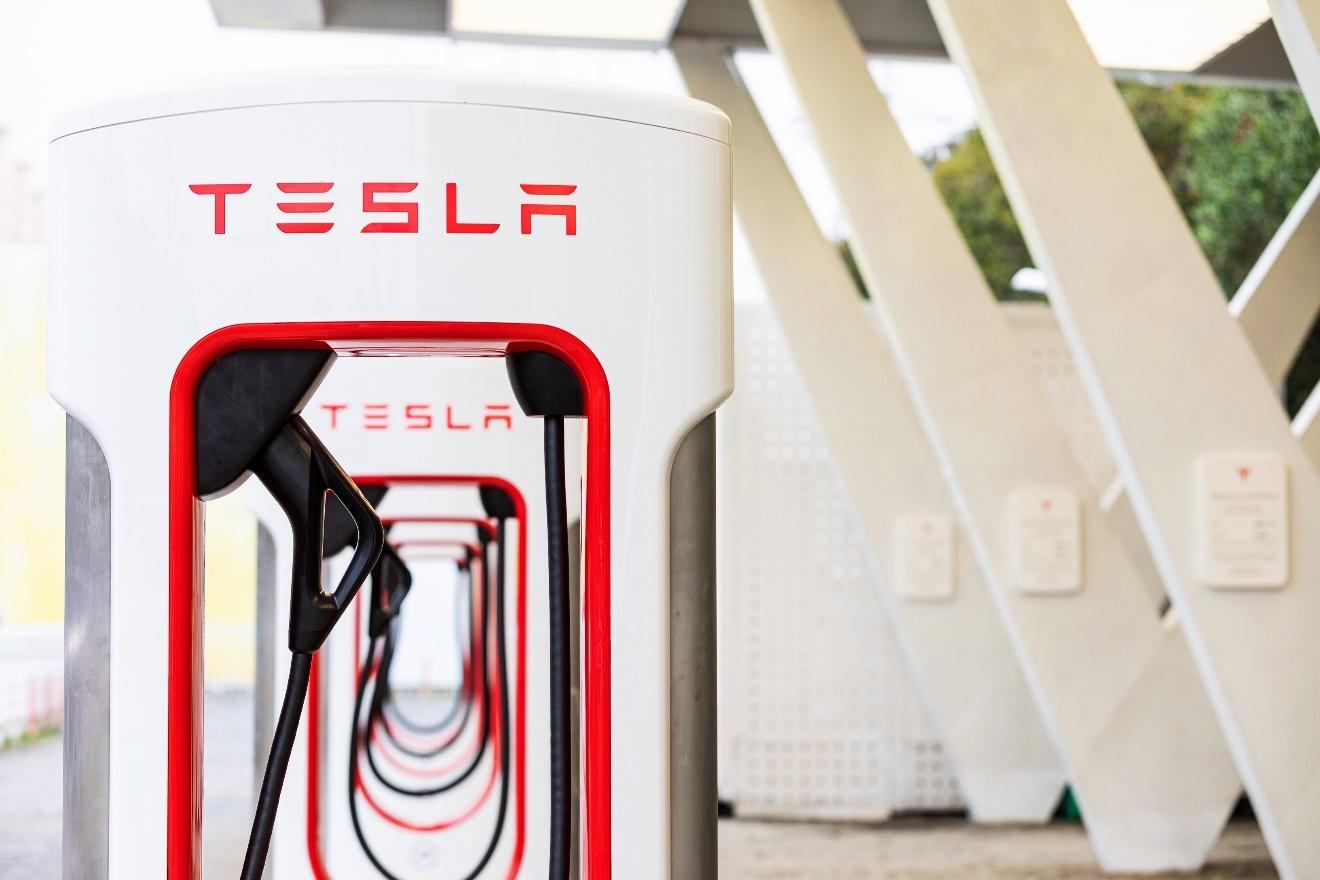Tesla rehires some Supercharger workers,reports says
According to reports, Musk is rehiring some members of the original Tesla Supercharger team, including Max de Zegher, the North American Charging Director
About two weeks ago, Musk suddenly cut off Tesla's entire Supercharger team and now seems to regret it.
Re-employ some Supercharger team members
According to reports, Musk is rehiring some members of the original Tesla Supercharger team, including Max de Zegher, the North American Charging Director.
According to Max de Zegher's personal profile on LinkedIn, he joined the company in 2013 and has been with Tesla for over a decade. Max de Zegher initially worked as a sales representative at Tesla, and in the following years, he served as a project developer, project manager, and regional manager, covering Tesla's operations in the UK, Europe, and North America.
From 2018 to 2021, he served as the Senior Manager of Charging in North America. Starting from July 2022, Max de Zegher served as Tesla's North American Charging Director. According to the data, he still holds the position to this day.

It is currently unclear how many members of the original overcharging team have been rehired.
Last month, Musk's decision to dismiss the entire Supercharger team shocked Tesla's investors, partners, and customers. Because in their view, Tesla's Supercharger team has performed commendably in recent years. Over the past year, traditional car giants such as General Motors, Ford, and Mercedes Benz have announced their joining of Tesla's charging network.
Aaron Luque, CEO of Envirospark, the installation company for Tesla's supercharging devices, said, "The team we are working with no longer has anyone. As far as Tesla's official communication is concerned, we have not received any news yet."
The questioning of disbanding the Supercharger team may be a key factor in changing Musk's thinking.
Previously, after announcing the layoffs of the Supercharger team, Musk posted on X stating, "Tesla still plans to grow the Supercharger network, just at aslower pace for new locations and more focus on 100% uptimeand expansion of existing locations"

Perhaps due to excessive questioning, Musk posted again last week stating that Tesla is still committed to producing charging devices.
Musk wrote, "Tesla will spend well over $500M expanding ourSupercharger network to create thousands of NEW chargers thisyear." He emphasized, "That's just on new sites and expansions, not countingoperations costs, which are much higher."

Steep shift in strategy
Previously, the rapid deployment of Tesla's Supercharger equipment benefited from government subsidies. As early as February 2022, the US government announced that it would allocate $5 billion to build 500,000 electric vehicle charging devices in the United States. According to a report by data consulting firm EVAdoption, Tesla has benefited significantly from the subsidy policy two years after its launch, receiving over $17 million in infrastructure subsidies, nearly 13% of the total subsidy amount.
At the end of last month, Tesla reported that its Supercharger station network consisted of over 57,500 charging stations and nearly 6250 charging stations, with year-on-year growth of 27% and 26%, respectively.
According to research firm Rho Motion, Tesla will have over 25,000 Supercharger devices in the United States alone by 2024, with 60% of their power exceeding 250kW. Moreover, due to Tesla's earlier and faster deployment, the company holds a 59% market share in the DC charging equipment field.
Due to Tesla's dominant position in the charging market, the reduction in its expansion scale will inevitably affect the overall growth of the industry. Therefore, the growth of the charging industry may slow down in the coming years, especially in the United States where Tesla dominates.
"The fast rollout of a public charging network was crucial in helping to support EV adoption," said Shan Tomouk, head of charging and energy research at Rho Motion. "Furthermore, the Supercharger network was a key marketing pull for people buying into the Tesla ecosystem due to its exclusivity. However, we saw a shift in strategy for Tesla with the announcement of the NACS and opening of the Supercharger market."
He believes that due to the desire to reduce company costs, Tesla is likely to question the benefits of continuing to expand its charging network: it no longer has the marketing pull of exclusivity; And it already has strong coverage across most perceived high-traffic areas.
Tomouk said, "Though this is something that would have had to happen eventually, it is clear that the slowdown in EV sales in recent months has placed pressure on the company to accelerate this plan in an abrupt way."

·Original
Disclaimer: The views in this article are from the original Creator and do not represent the views or position of Hawk Insight. The content of the article is for reference, communication and learning only, and does not constitute investment advice. If it involves copyright issues, please contact us for deletion.